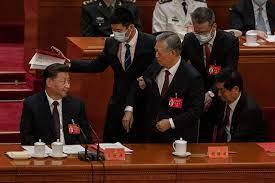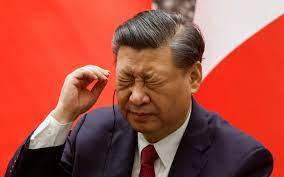Floods, economic headwinds and disappearing ministers aside, experts say the Chinese leader’s iron grip on power may be his biggest problem.
‘He’s had a bad summer’: Xi faces calls to loosen grip as China’s crises mount -- reported London-based newspaper 'The Guardian' on Sept 17, 2023. It is purely coincidence that September 17th is also the birthday of Prime Minister Narendra Modi.
Xi has had “bad summers” before – 2018 was noted for its economic troubles, a trade war with the US and a vaccine corruption scandal, while 2022 saw the disastrous zero-Covid exit and “white paper” protests. But experts say the issues that have plagued him this year are at least partly because he has centralised so much power around himself.
“The major challenges Xi is facing seem to be the ones created by his iron grip on power,” says Rorry Daniels, managing director of the Asia Society Policy Institute. “When you make your circle of trusted advisers smaller and smaller, it’s hard to get good [intel].”
There were other problems too.
China's biggest property developers Evergrande and Country Garden are not the only ones singed by President Xi Jinping's policies hindering big firms to raise funds. Even China’s state-owned property developers did warn of widespread losses.
As part of Chinese President Xi Jinping's policy to crack down on big firms in China, more than 100 regulations were imposed on businesses that raised huge money via equity funds, borrowings, and IPOs in 2020. One of these laws set a very strict cap on the borrowings of companies.
While many Chinese firms took a financial hit due to this cap, Evergrande was one of the worst affected as it has borrowed upwards of $300 billion, which includes $19 billion in offshore US dollar-denominated bonds.
Since the sector's debt crisis unfolded in mid-2021, companies accounting for 40 percent of Chinese home sales have defaulted, most of them private property developers.
Chinese president Xi Jinping’s decision to skip the G20 Summit in New Delhi was seen as an attempt to avoid 'losing face'.
It is largely felt that under Xi China has become more authoritarian.
In October 2022, a video is now shows how Xi’s immediate predecessor, Hu Jintao, 80, was 'unceremoniously escorted out' of the Great Hall of the People at the party’s national congress.
 |
| Escorting out of Hu Jintao |
Sources said that at this year’s gathering, a group of retired party elders reprimanded the top leader in ways they had not until now. Xi later expressed his frustration to his closest aides.
The challenges for China are multiple. High youth unemployment; high debt levels in both the private and public sectors; falling private investment as a result of intimidation by the ruling party.
There is ageing problem and also a commitment to state capitalism that hampers total factor productivity growth. On the other hand, experts say the US has "fanned Chinese fears" of containment by reinforcing its Indo-Pacific alliances through the Aukus pact, the Quad, and an Asian pivot by Nato.
In most of these say Indo Pacific and Quad, India is a key component. Aukus, is an acronym for the trilateral security pact between Australia, the United Kingdom, and the United States.
'Foreign Affairs' reported :
In the early months of 2023, some Chinese thinkers were expecting that Chinese President Xi Jinping would be forced to pause or even abandon significant parts of his decadelong march toward centralization. Over the previous year, they had watched the government lurch from crisis to crisis.
First, the Chinese Communist Party had stubbornly stuck to its “zero COVID’’ strategy with vast lockdowns of some of China’s biggest cities, even as most other countries had long since ended ineffective hard controls in favor of cutting-edge vaccines.
The government’s inflexibility eventually triggered a backlash: in November 2022, anti-government protests broke out in some pockets.
Second global 'headline hunter' ---- Ukraine President Volodymyr Zelensky
President Volodymyr Zelensky has said that there was no end in sight to Russia's invasion of Ukraine, as fatigue builds among Kyiv's allies nearly two years into the war and the Kremlin voices growing confidence of victory.
Zelensky said he had turned down a request from the military -- for now -- to mobilise as many as 500,000 Ukrainians for the army.
This was even otherwise seen as an unpopular proposal.
"No one knows the answer," Zelensky told reporters in response to a question of whether the war with Russia could end next year.
"Even respected people, our commanders and our Western partners, who say that this is a war for many years, they do not know," he said.
'Lost child in a fair' was how social media outlets reacted to Zelensky's photo at NATO Summit
The war in Ukraine created a new axis of evil, went an article in 'The Wall Street Journal'.
Russian president Vladimir Putin boasted that Ukraine was so beleaguered that Russia’s invading troops were doing “what we want.”
“We won’t give up what’s ours,” he pledged, adding dismissively, “If they want to negotiate, let them negotiate.” But in a recent push of back-channel diplomacy, Mr. Putin has been sending a different message: He is ready to make a deal, says 'The New York Times'.
Mr. Putin has been signaling through intermediaries since at least September that he is open to a cease-fire that freezes the fighting along the current lines, far short of his ambitions to dominate Ukraine, two former senior Russian officials close to the Kremlin and American and international officials who have received the message from Mr. Putin’s envoys say.








No comments:
Post a Comment